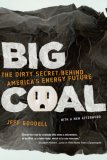Summary | Excerpt | Reading Guide | Reviews | Beyond the Book | Readalikes | Genres & Themes | Author Bio

Critics' Opinion:
Readers' Opinion:
First Published:
Jun 2006, 352 pages
Paperback:
Apr 2007, 352 pages
 Book Reviewed by:
Book Reviewed by:
BookBrowse Review Team
Buy This Book
Oil is the most critical fossil fuel for modern economies,
underlying everything from transportation to manufacturing. In 2004, the world
consumed about 80 million barrels of oil each day, about 30 percent of which
came from the Middle East. The world is not going to run out of oil anytime
soon, but it might run out of cheap, easy-to-get oil. As that happens, prices
are likely to spike, fundamentally disrupting major parts of the world’s
economy. You don’t have to buy into the apocalyptic scenarios that some
doomsayers predict — the collapse of industrial society, widespread
famine — to see that the end of cheap oil is going to inspire panic and
economic chaos as the world scrambles to find a replacement energy source.
The situation with natural gas is not much better. In the United
States, consumption of natural gas, which is mostly used for home heating
and the manufacture of industrial products, as well as agricultural fertilizers
and chemicals, has jumped by about 40 percent in the past two decades.
About 85 percent of that gas came from domestic sources, but production in
the United States has been flat for several decades, leading us to import
more and more from Canada, where production is also beginning to peak.
There are still substantial reserves in places such as Russia and Qatar, but
the global shipping and trading infrastructure is woefully undeveloped.
Upgrading it will cost billions of dollars and take decades to complete. Not
surprisingly, natural gas prices have tripled in the past few years and caused
home heating bills to rise rapidly in many regions of the country.
What about the other alternatives? Nuclear power can be used to
generate electricity, but no new plants have been built in America in thirty
years. This is primarily because nuclear plants are still haunted by the
ghosts of Three Mile Island and Chernobyl, as well as unresolved problems of
radioactive waste. Even if the social and environmental hurdles could be
overcome, nuclear plants are so expensive to build that a major resurgence is
unlikely. And as much as we would all like to imagine we could live in a world
powered by solar panels and wind turbines, these alternative energy sources
are not yet capable of powering our high-tech economy.
Out of this, coal has emerged as the default fuel of choice. Coal
has a number of virtues as a fuel: it can be shipped via boats and railroads,
it’s easy to store, and it’s easy to burn. But coal’s main advantage over other
fuels is that it’s cheap and plentiful. There are an estimated 1 trillion tons of
recoverable coal in the world, by far the largest reserve of fossil fuel left on the
planet. And despite a run-up in coal prices in 2004 and 2005, coal is still
inexpensive compared to other fuels. In a world starved for energy, the
importance of this simple fact cannot be underestimated: the world needs
cheap power, and coal can provide it.
America is literally built upon thick seams of coal. Just as Saudi
Arabia dominates the global oil market because of the geological good luck
of having more than 20 percent of the world’s oil reserves, the United States
is a big advocate for coal because it has the geological good luck of having
more than 25 percent of the world’s recoverable coal reserves—about 270
billion tons—buried within its borders. As coal industry executives never tire
of pointing out, this is enough coal to fuel America at the current rate of
consumption for about 250 years. To put the size of its bounty into
perspective, consider this: all of western Europe has only 36 billion tons of
recoverable coal. China has less than half as much as the United States—
126 billion tons. India and Australia, both big coal burners, have even less
than China. The only country with reserves that come close to America’s is
Russia, with 176 billion tons, but much of that coal is in remote regions and
difficult to mine. Not surprisingly, coal boosters often refer to America as “the
Saudi Arabia of coal.”
Copyright © 2006 by Jeff Goodell. Reprinted with permission by Houghton Mifflin Company.





The House on Biscayne Bay
by Chanel Cleeton
As death stalks a gothic mansion in Miami, the lives of two women intertwine as the past and present collide.

The Flower Sisters
by Michelle Collins Anderson
From the new Fannie Flagg of the Ozarks, a richly-woven story of family, forgiveness, and reinvention.

The Funeral Cryer by Wenyan Lu
Debut novelist Wenyan Lu brings us this witty yet profound story about one woman's midlife reawakening in contemporary rural China.
Your guide toexceptional books
BookBrowse seeks out and recommends the best in contemporary fiction and nonfiction—books that not only engage and entertain but also deepen our understanding of ourselves and the world around us.